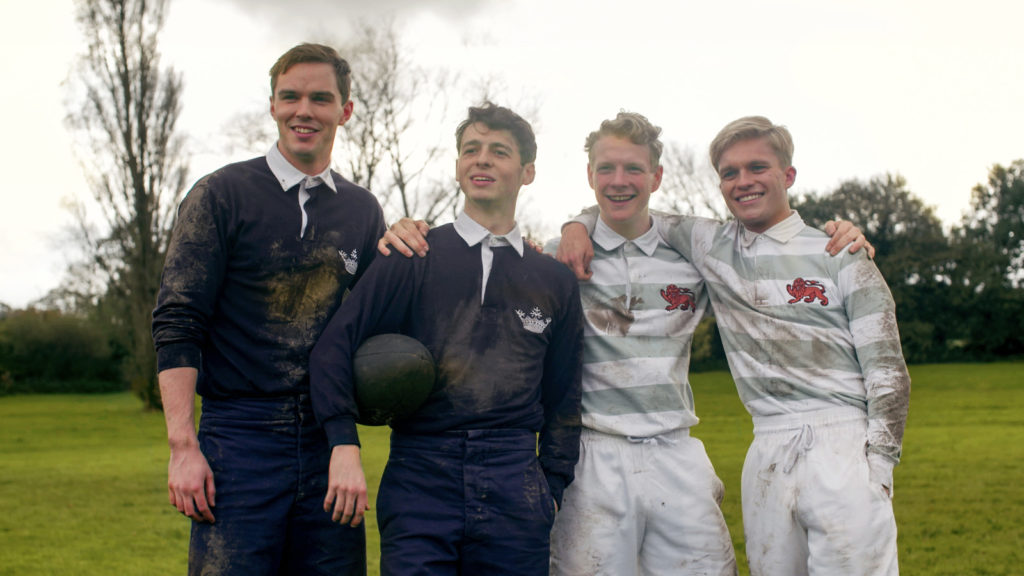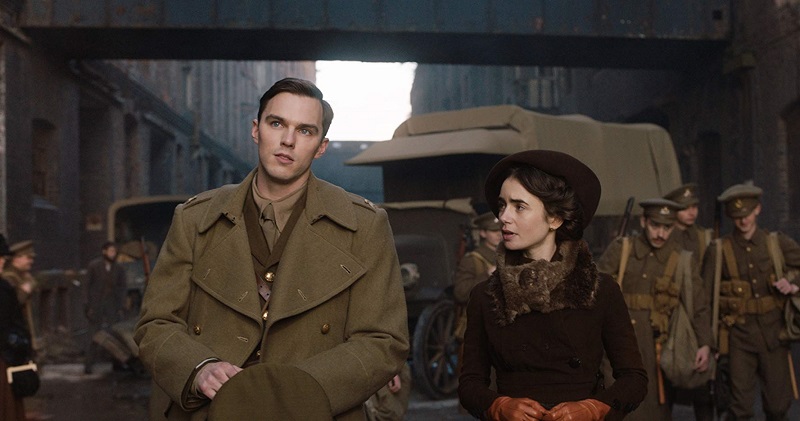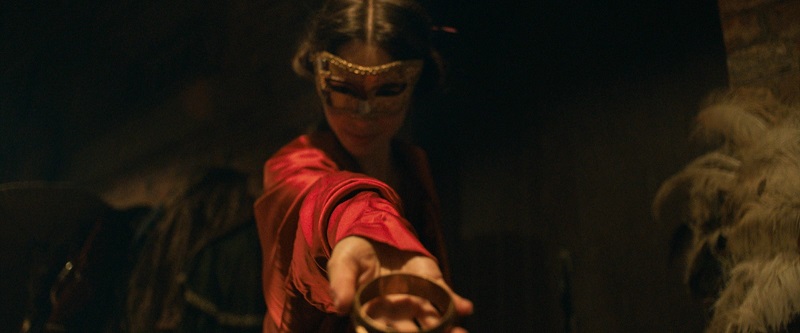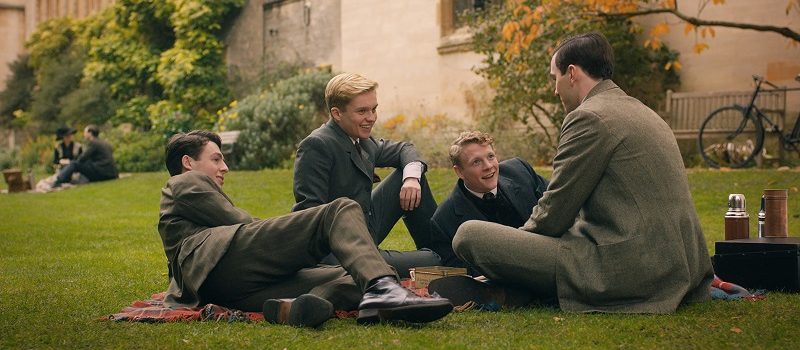Capturing an author’s creative inspiration on the screen is nothing new, but that doesn’t lessen the utter challenge that is bringing it to life. Those involved in the biopic, that is a look at famed author J.R.R. Tolkien and how the vastness of his life inspired The Hobbit and of course The Lord of the Rings, not only face the issue of capturing the iconic author’s life and doing it justice, but subliminally has to also compete with the vivid and treasured cinematic worlds that Peter Jackson crafted with his films based on the legendary writings of the English fantasy writer.

First off, they scored with casting. Nicholas Hoult rivets as Tolkien and through his titanic talent viewers are treated to a layered look at one of the most famous folks to ever put ink to page. After slaying it in the Oscar winning The Favourite,Hoult does the period piece again and this time out he must carry the entire film on his shoulders. It is a complex character to tackle that also has an uphill battle against an army of literary aficionados who think they know everything there is to know about the man who created Middle Earth and enlivened the youth (and adulthood) of countless souls with his magical tales of fellowship.
There is much that shaped not only the writings of Tolkien, but who he was as a man, as a father, as a husband and most importantly for the sake of this story, what made him such a loyal friend.
Dome Karukoski helms the project and works a script by David Gleeson and Stephen Beresford that does its best in giving a visual and literary representation of one of the most cerebral things a human being can do—write creatively. It is slow moving at times, but that is something that tends to happen with biopics based on those who wield words like their characters wield their swords. The director and his screenwriters play loosely with the time and fluxgate from various presents and pasts that embody the late great English author.
There is his orphaned youth. His esteemed boarding school days, time at Oxford University and of course and most horrifyingly raw, Tolkien’s time in the trenches during World War I—the “war to end all wars.” Karukoski zig-zags across the various moving timelines and for the large part, it is a successful method of moving story forward. The issue is, as is the case with many a biopic, there is so much rich material that even though Karukoski and his team of storytellers probably did “kill their darlings,” there was still much that could have been tightened at the least and cut out at the most. It’s hard, as a writer I can feel their collective pain. Since many who seek to enter the creative world of moviemaking are inspired by The Lord of the Rings and The Hobbit, it was likely difficult finding which aspects of Tolkien’s life could be left on the cutting room floor, which require a quick once over and those that warranted further exploration.
The love story was impeccably handled. Since his utter adoration of Edith Bratt (Lily Collins) drove much of his modus operandi, it is an aspect of Tolkien that makes you want to celebrate all-things love. She and he were fellow orphans (that’ll shape one’s world view) and met at the prestigious boarding school that Tolkien’s priest, Father Francis (the always awesome Colm Meaney), had arranged for him to attend—all with hopes that he would go on to Oxford or Cambridge and “make something of himself.”
It is also at that school that a little trouble he gets into while playing rugby leads him to become a part of a friendly foursome that would define him. Again, casting is key. A solid symmetry arises between those tasked with portraying the younger versions of these four friends and the more mature thespians tapped to capture them as more adult versions of these lads and of course who they would become as adults. Anthony Boyle stuns as Geoffrey Smith, Patrick Gibson nails it as Robert Gilson while Tom Glynn-Carney charms as aspiring composer Christopher Wiseman. Although their parents have certain aspirations for their children, the fab four each share something else other than fellowship and that is an adoration for the arts. Of all of them, they all see something in Tolkien … even though he proports to be a writer, he has never produced a word that they ever experience (at first).

The fellas are having quite the time of it at university when Germany invades Belgium and World War I starts its assault on an entire generation of young men. For Tolkien’s part, he is haunted by the fear that he is losing his friends to the life stealer that is war. At times it freezes him, but at other moments, it sends him into the hell that is No Man’s Land. Not one soul who experienced the trench torture that was that war emerged from it unscarred. Tolkien was no different. The thing is when he returned home after the fighting ceased, he had the love of his life waiting for him, along with the family they would lovingly made and nurtured. His position as a professor at his alma mater put a roof over their head but seemed to stymie any kind of creativity he aspired to over his lifetime. As wives are known to do, they cut through all the wishy-washiness and lay it on the line for their other halves. She gives him an ultimatum … either start to write or never mention it again.
History tells us the choice he made.
There are inspirations for fans of Tolkien’s Middle Earth strewn throughout Tolkien. Sadly, it is not highlighted enough or as finely as it should. Aspects are hinted at, such as the surrounding landscape of his first home clearly inspired the idea of The Shire and dragon fire arising from the horrifying shadow of flamethrowers on the front lines of war. No, filmmakers need not hit us over the head with these moments, but that would have been an important aspect of the story to pump up instead of other elements that in hindsight after witnessing the film, do not seem as integral to what a Lord of the Rings fan would want to know from a Tolkien biopic.
The performances across the board do justice to all who encircled Tolkien’s world. Collins is delightful embodying the author’s amorous journey. Again, Hoult could not have been a better choice to capture so many formative years of a Tolkien’s tale. He mesmerizes, particularly, in showcasing the goings-on in the author’s head that is often so hard to bring to life in the film format. It takes an actor of serious skill to take us inside a character’s mind with merely facial gestures and body placement. Those who inhabit his three friends also astound in that there are elements of that Fellowship of the Ring that each teases with aspects of their performance. Derek Jacobi serves as a sensational catalyst for our young writer with his role as Professor Wright, a priceless piece of the epic puzzle that is Tolkien’s tale.

Tolkien clocks in at eight minutes shy of two hours. Yet, it strangely feels a tad lengthier, but in no way too long. That is not truly anyone’s fault. It is the nature of the beast that is the biopic of an author. We saw it with Saving Mr. Banks, Finding Neverland and yes, Kill Your Darlings. Writers, particularly those of dense novels that transcend time, genre and the medium of literature, beg the biopic treatment stemming from their sheer greatness and what they collectively mean to a wide swath of the world’s population. Yet it is a double-edge sword in how one creates words and worlds does not necessarily make for the most compelling of cinematic experiences. Tolkien does a decent job with the endeavor and kudos must be levied on filmmakers for not overdosing us by force feeding direct correlations between Tolkien’s true tale and his book brilliance.
Grade: B

